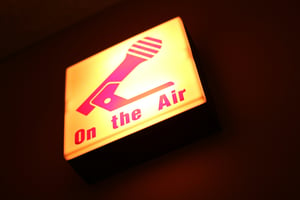Media interviews can be a bit like buses.
How do you feel about giving a media interview?
Speaking to the media presents a great opportunity.
But it can also feel stressful, nerve-wracking and unnatural.
Being asked to give television interviews and appear in front of a camera can feel particularly daunting, regardless of whether you are the CEO of a stock market-listed company, lead a small charity or organisation or have recently started your own company.
And the media can sometimes feel like a maze with different media skills needed for television, radio and print interviews.
Effective media interview training will help
Why is media training important? It helps spokespeople communicate with clarity and confidence, whatever the format.
It develops and hones the key skills so interviewees get their message across successfully and avoid the classic car crash interview mistakes you may have seen.
And media training also demystifies the labyrinth of complexity that can surround the media world.
TV, radio, newspapers, and even social media, deliver news in different ways. So, we will explore the interview skills needed for the different interview formats.
But let's start with some interview tips that work across TV, radio and print.
Eight ways to prepare business executives for media interviews
- Audience. Make sure you know who you are talking to. The journalist is not your audience. It is the people watching, listening and reading your media interviews. Understand who they are and think about what you want them to do as a result of the interview.
- Keep it simple. There can be a temptation to talk differently in media interviews. But every day, conversational language works best. Stick to the same words and phrases you would use if talking to friends and family. And stay clear of the dreaded jargon and corporate speak.
- Front-load. Look to get your message across early. Don't wait for the 'right question' - it might not come up.
- Examples. You need to support your message with examples. Preferably human ones. People love stories about other people. They draw people into what you are saying and make it human.
- Be concise. You're a passionate business leader or head of an organisation. You are proud of its work and can talk about it at length. But one of our golden media training tips is to avoid rambling answers. They are hard to follow.
- Consider the negatives. What tough questions or wider issues could be brought into the interview? As we stress during our media training, even if your subject is positive, there may be other issues the journalist wants to discuss during almost all media appearances. These questions can often be anticipated, and spokespeople can consider how to answer them without sounding defensive or saying something distracting.
- Do your homework. Interviews are rarely planned weeks ahead, but there should be time to learn about the media organisation and journalists you will be talking to. Different outlets have different audiences and will approach stories differently. A TV interview with GB News will be different to a BBC News one. Some journalists have reputations for asking harder-hitting questions than others. They may even have a particular interest in your sector.
- Practice makes perfect. It is one of the media training tips we repeat regularly. We cannot stress enough the importance of preparation and practice. Whatever the format, rehearse.
Let's have a look at the main interview formats in more detail, together with some of our media training tips - starting with TV.
Media training tips for TV interviews
A TV interview presents a huge opportunity. It offers the chance for your views and opinions to be seen and heard by millions, helping you reach new customers and supporters and engage existing ones.
TV continues to be the most important news platform in the UK.
Adults watched an average of 113 hours of TV news in 2021. Those over 65 watched 233 hours.
But it can also feel intimidating, even for experienced business leaders used to addressing board members, clients and employees. Studios, in particular, can feel alien with the lights, cameras, producers and stage managers.
This is why media training matters. It doesn't just help spokespeople answer questions confidently. It helps them get used to strange environments and different interview formats.
So, what are the vital TV interview tips?
Well, TV interviews have evolved. Covid changed the media landscape with restrictions meaning interviews happened remotely on Zoom and Teams. And it remains a popular option, allowing journalists to get people on air quickly.
But, while it is convenient, it has proved tricky format for spokespeople.
As well as being the interviewee, you may also need to be the camera technician. And you are in charge of lighting and sound.
No matter how strong your message or key points are, poor lighting and camera angles, as well as cluttered backgrounds, will distract your audience.
Another distraction can be a failure to maintain eye contact. The temptation is to look at the person on your screen. But that can make you look shifty. So, another of our top TV interview tips is to look right down the barrel of the lens of your webcam.
Given the choice between a pre-recorded or live TV interview, opt for live. Pre-recorded may feel like the safer opportunity - people fear making a mistake in front of a live audience. But live interviews give spokespeople more control and greater opportunity to get their key messages across.
TV is a visual format. So, think about your body language and what you wear.
During our media training, we tell delegates to avoid clothing and jewellery that could distract the audience.
Block colours look good on camera, but avoid black and white because they are harsh and can make you look stern or washed out. Leave patterns and stripes in the wardrobe as they create a strobing effect with many TV and video cameras.
And a media interview is probably not the right time to try out a new outfit.
In terms of body language, other media training tips include avoiding foot tapping, clenching fists, and shifting back and forth, which can all suggest nervousness. If it is good news, smile.
And maintain eye contact with the journalist, otherwise, you may seem shifty.
Radio tips: How can you ensure your interviews are on the right wavelength?
Radio grabs attention like nothing else and presents an excellent opportunity for your organisation to get its message across.
According to the latest Ofcom report, four in ten adults get their news from radio.
One of our most important radio interview tips is to start strongly. As we stress to delegates on our media training courses, radio interviews will be your shortest media appearance – the average radio interview is about two and a half minutes.
And you are talking to an audience that is multi-tasking. So, grab attention by ensuring you get to your message at the start.
It is also vital to be yourself. The best radio show interviews feel like a conversation.
So, aim to be yourself and use the same language you would use if you were talking to a friend or colleague.
Try to put messages in your words (within corporate guidelines) and be prepared to share relevant anecdotes and stories about yourself that reinforce your points.
You also need to bring passion, energy and enthusiasm. Try to at least match the energy levels of the journalist carrying out the interview.
It seems a bit odd telling you to smile on radio. But one of our current working journalist tutors says, “you can hear a smile on the radio”. It helps to bring some of that energy and enthusiasm we’ve been talking about. Similarly, the audience will sense if you are talking with a frown.
An often overlooked, but increasingly important, tip is to prepare to be on camera during radio interviews.
Many stations have cameras. Other radio interviews are also often carried out on Zoom. And videos are made of the interviews and shared on social media.
So, be mindful of your body language and be careful not to do anything you wouldn't want to be seen by listeners. It is also another reason to consider whether you need extensive briefing documents or cheat sheets with you.
Black, white and still read all over?
Covid accelerated changes already happening in the media.
Newspapers, struggling with the rise of online news sources and social media channels, saw circulations and advertising revenues plummet further.
Many publications, including The Sun, The Times, The Telegraph and The Guardian, have now opted out of publishing monthly circulation figures amid concerns they fit a narrative of the declining power of newspapers.
Some regional and local newspapers are now online only. Others have closed.
But it is not as bleak as it might sound. Many print publications now have a strong online and social media presence.
And their stories are seen by many eyes.
The Daily Mail, for example, has 22.4 million unique monthly visitors. It is joined among the top 10 biggest news websites in the world by The Guardian.
But, with increased time pressures and fewer resources, the journalist's job is arguably harder than ever.
And it means many print interviews will take place on the telephone. Phone interviews are a format we often include during our media skills training courses.
Phone interviews tend to be tricky. You can't see the reporter, and it can be harder to build rapport. You also can't tell whether they are scribbling down everything your say or looking baffled.
So, how about some phone interview tips from our media training?
- Telephone print interviews may not seem as stressful as a TV or radio appearance. But they are not an easy option - you must prepare as thoroughly as you would for a broadcast one.
- Avoid distractions. Try and find a quiet place for your telephone interview. If you are in the office, book a meeting room. Interviewing from your desk could see the background noise of your colleagues become an issue. If you are sat in front of your computer, emails could cause you to lose concentration. Working from home? Try to find a room where you can get away from everyone else in the house and ensure they know not to disturb you.
- Use a landline. It removes any signal issues.
- Don't use speakerphones. It impact sound quality and can lead to the journalist struggling to hear what you want to say.
- Stand up. The phone often deadens the voice a little. Standing up will inject some energy into it.
Need some more phone interview tips and advice? We've got you covered.
What about a specialist trade magazine interview?
Trade publications may lack glamour. But they should not be undervalued.
They are aimed at audiences with genuine interest in your sector and are read by decision-makers.
Giving an interview to a trade publication does not mean the story will necessarily stay within the sector.
National and regional newspapers and broadcast journalists view trade titles as credible sources of information.
Many of our current working journalists use them to research, develop and follow up stories they are working on and find ones they feel could interest a wider audience. So, your PR team should include them in their strategies.
Although the media interview fundamentals are the same, there are some differences you should know.
Probably the most important media training tip here is that trade journalists will typically want to delve much deeper under the skin of a story. Greater detail is required. So, more extensive briefing could be needed.
It is also vital they are not viewed as an easy option.
Trade interviews can be a good introduction for inexperienced spokespeople starting their media training journey.
But spokespeople still need to prepare properly, ensuring they are clear on the message they want to get across, examples they will use and that they are quotable.
And they still need to prepare for the negative questions. A trade journalist is just as likely to ask tough questions as their mainstream media colleagues.
Make sure you have read the latest copy of the publication you are about to speak to - they all take different approaches and have different audiences and tones that spokespeople need to be aware of before they start speaking to reporters.
Should podcast interviews be part of your public relations plans?
There are no longer just three common interview formats.
Podcasts are booming.
After taking off during the pandemic, there are now more than 19 million podcast listeners in the UK.
Just under 20 per cent of people who took part in Ofcom's news consumption survey say they get their news from podcasts.
The News Agents podcast, presented by three former BBC journalists, exceeded 10 million downloads three months after its launch in 2022.
Public relations and communications teams are increasingly looking to include them in their strategies. And they feature in our media training courses with increasing regularity.
What's the advice for spokespeople here? Is it the same as the radio interview tips?
Well, podcast interviews are unlikely to have the same time constraints. Your spokesperson could be interviewed for around 45 minutes. Some podcasts are 90 minutes long and feature the guest throughout.
So, there is greater scope to get key messages across and share stories and anecdotes.
Spokespeople in podcast interviews must also prepare to face more personal questions.
The intimate nature of the format offers greater scope to discover more about the spokesperson, as well as what they want to talk about.
While you may want to talk about a new service or product, many questions could be about the person behind it.
You would not find us recommending spokespeople ask questions to the journalist during our media skills training courses because you don't know what the journalists might say. And you can quickly lose control.
But the longer length of this format creates more natural conversations. And conversations normally involve more than one person asking questions.
Don't be shy
Hopefully, this training tips guide helps you feel more confident about media interviews.
They present a brilliant opportunity for you to communicate your brand with clarity and confidence. And control the narrative.
Media training helps build confidence and develop skills so you can make the most of media opportunities.
The more you master your skills, the more likely you are to offer something valuable in your media interviews. And when you do that, you are more likely to secure a repeat interview, achieving more coverage.
Need more advice and tips? Download our free eBook on preparing for a media interview
Media First are media and communications training specialists with more than 35 years of experience. We have a team of trainers, each with decades of experience working as journalists, presenters, communications coaches and media trainers.
Click here to find out more about our media training




